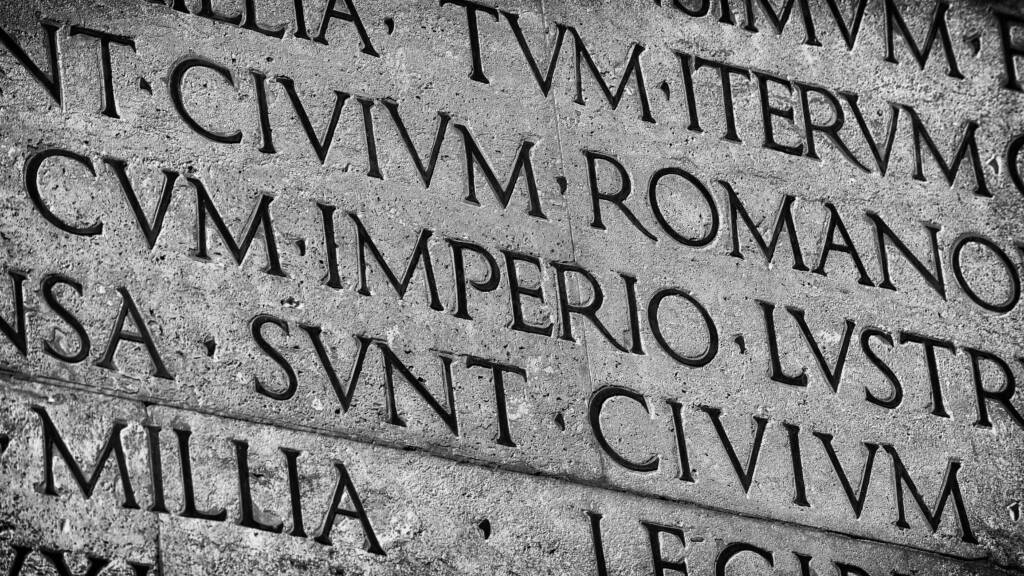
Latin 2

History-changing battles, great poets and statesmen, classic art and architecture, and a language that was heard throughout most of the known world. In Latin I, students read the opening credits of this epic movie. In Latin II, the plots and the characters that populated ancient Rome come alive. In this course, students build on their knowledge of Latin grammar and vocabulary. In the process, they sense the beauty of the language and the passion of those who speak it. A clear, expressive, and flexible language—a language in which students can communicate—supports Roman engineering, art, commerce, and a system of laws. This course gives students a solid grounding in the structure of the language. It also gives them a clear lens for looking into the heart and majesty of the Roman spirit.
Major Topics and Concepts
- Review of Latin I grammar and vocabulary
- Latin Vocabulary and English Derivatives
- Third Declension, masculine, feminine, neuter
- Characteristics of Epic Poetry and The Odyssey
- Relative Pronouns and Interrogative Pronouns
- Third Declension “-i” stems
- The Compound of Possum and Review of Sum
- Third Declension Adjectives
- Demonstrative Pronouns/Adjectives and Intensive Pronouns/Adjectives
- People, Roles, Laws of the Period of the Monarchy
- Historical Readings and Translations
- Ablative Absolute and Future Participles
- Reflexive Pronouns and Adjectives
- Fourth and Fifth Declensions
- Latin Vocabulary and English Derivatives
- Present, Perfect, and Future Participles
- Historical Discussions and Roman Provinces
- Famous Historical Quotes
- People, Places, and Events of the Republican Period
- Life of Julius Caesar
- Present, Perfect, and Future Infinitives
- Roman Army, Great Battles: Alesia, Philippi, Pharsalus, Zama and Actium
- Heroic Figures of the Republic: Cincinnatus, Regulus
- Mottoes and Abbreviations
- People, Places, and Events of the Empire
- Fall of the Roman Empire
- Historical Timeline
- Indirect Statement
- Mythology: Overview and Stories in English and Latin and Mythology Vocabulary
- Comparison of Adjectives: regular, irregular, and -er
- Comparison of Adverbs
- Community Mythology Survey
Competencies
Declension Noun Forms and Uses, Verb Forms and Uses, Historical Elements
Students will demonstrate an understanding of 1st, 2nd and 3rd declension noun forms and uses, active and passive voice verb forms, tenses and uses for regular and irregular, and elements of mythological and historical culture of Rome’s founding by interpreting and communicating in written and spoken Latin with sentences and short stories.
Pronoun Forms, Clauses and Cultural Aspects of Rome’s Government
Students will demonstrate an understanding of the use of relative pronouns and pronoun agreement, independent and dependent clauses and cultural aspects of the founding documents of Rome’s government by interpreting and communicating in written and spoken Latin with sentences and short stories.
Interrogative Pronouns and Adjectives, 4th and 5th Declension, Intensive Pronoun Forms, and Cultural Aspects of Infrastructure
Students will demonstrate an understanding of the use of interrogative pronouns and adjectives, the use of intensive pronoun forms, 4th and 5th declensions and the cultural comparisons of infrastructure of the Roman city and the villas of the Roman countryside by interpreting and communicating in written and spoken Latin with sentences and short stories.
Comparative, Superlative, Irregular Adjective and Adverb forms and Cultural Aspects of Roman Wars
Students will demonstrate an understanding of comparative and superlative forms of adjectives and adverbs, irregular adjectives and adverbs and their comparative and superlative forms, and cultural aspects of Roman wars by interpreting and communicating in written and spoken Latin with sentences and short stories.
Participles and Infinitives and Cultural Aspects of Emperors
Students will demonstrate an understanding of participle forms and new infinitives forms and cultural aspects of emperors by interpreting and communicating in written and spoken Latin with sentences and short stories.
Indirect Statement Tense Use and Construction and Cultural Aspects of Roman Poets and Orators
Students will demonstrate an understanding of tense use in indirect statements, indirect statement construction, and cultural aspects of Roman poets and orators by interpreting and communicating in written and spoken Latin with sentences and short stories.

